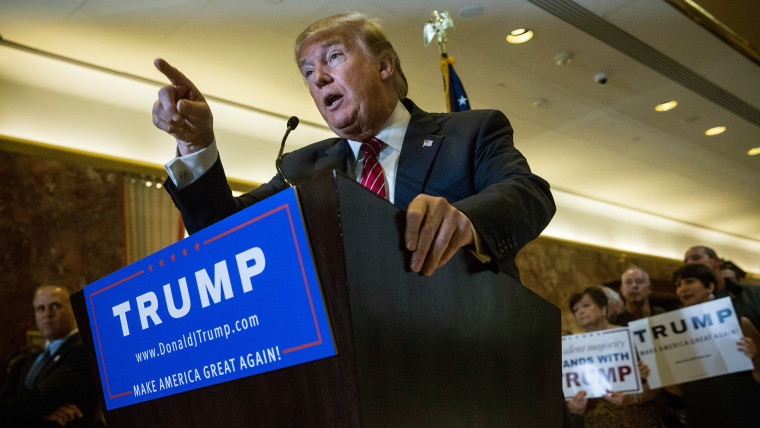It was just last month when Donald Trump
signaled a willingness to break with Republican Party orthodoxy on tax policy. The candidate's other flaws notwithstanding, Trump's ideas on taxes seemed like a breath of fresh air for a party with a borderline religious fealty to trickle-down theory.
The GOP candidate at times nearly came across as a populist. Trump
complained, for example, that multi-millionaires are currently “paying very little tax and I think it’s outrageous.” Might he even be prepared to raise his own taxes? “That’s right. That’s right. I’m OK with it,” Trump said a month ago. “You’ve seen my statements, I do very well, I don’t mind paying some taxes.”
Republican presidential front-runner Donald Trump proposed slashing taxes for Americans and corporations alike on Monday in his most specific policy proposal to date.
I should note, somewhat sheepishly, that I took Trump's rhetoric last month at face value, assuming that he would not only offer a different tax policy than most Republicans, but also a different kind of approach to tax policy. That is, after all, precisely what the GOP frontrunner was describing in late August.
But it now appears there's a gap between what Trump said and what he's proposing. Put it this way: the far-right Club for Growth
hated what he had to say in August, but the group is
delighted with Trump's plan now. Grover Norquist is
pleased, too.
The
Washington Post's Greg Sargent
summarized the big picture nicely: "Donald Trump may have just played us all for suckers."
The details matter, of course, and Vox's Dylan Matthews piece
sketched out the blueprint.
The plan ... is being sold as a populist overture, a cut for the poor and middle class that still hits rich hedge fund managers, in sharp contrast to the more rich-friendly proposals of Trump's rivals like Jeb Bush, Marco Rubio, and Rand Paul. "I don't want to have certain people on Wall Street getting away with paying no tax," Trump told 60 Minutes' Scott Pelley on Sunday night. But in reality, Trump's proposal promises cuts for the rich even larger than Bush's. It slashes the corporate tax rate by more than half. It cuts tax rates on capital gains and investment income. It's an orthodox supply-side conservative tax plan in a middle-class tax cut's clothing.
The unorthodox has become the conventional. Under the Trump plan, the top marginal rate, paid by the wealthiest earners, would drop from 39.6% to 25%, and the estate tax, paid exclusively by multi-millionaires, would be eliminated entirely. The corporate tax rate would be slashed, too.
While presenting his plan earlier today, Trump said the country's top earners "
will not be thrilled" with his proposal. I disagree -- if a package like this were implemented, they'd be delighted.
Trump backers will be quick to note that there are significant tax breaks for middle-class earners and the controversial carried-interest loophole, reserved for hedge-fund managers and the private-equity industry, would be scrapped. That's true. But (a) the bulk of the benefits will disproportionately benefit those at the top; and (b) Trump has presented no credible means to pay for any of this.
As
Mother Jones' Kevin Drum
explained, "Here's the bottom line: The sum total of Trump's plan to offset his huge tax cuts for the rich is this: 'Reduce or eliminate other loopholes for the very rich and special interests' -- except for two of the biggest ones, of course. Take that, you pencil-necked geeks at the Tax Policy Center, who want to use 'arithmetic' and 'logic' to score Trump's plan to see if it adds up. You can't! Hah!"
All of which raises the question of why Trump didn't stick with the vision he presented a month ago. Perhaps he's slowly making the transition from unconventional Republican with no realistic shot of success to conventional Republican who actually expects to compete for the nomination?
Maybe. But it's equally possible that last month's rhetoric was a scam, intended to work the refs and fuel perceptions that he's far more different from his GOP rivals than he really is.
